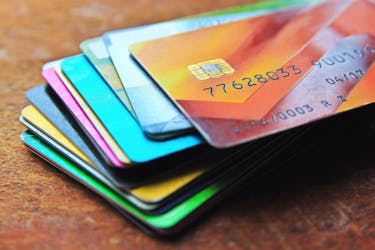
The DIY Debt Elimination Worksheet
In This Article
Debt Consolidation is Usually a Bad Idea
Personal finance is 80% behavior and 20% head knowledge.
Ready to light your credit cards on fire? Let’s do it. But let’s use a credit union so you’re not trading a rock for a hard place. Credit unions are the best option to be credit card debt-free, and save big money on interest rates.
That’s another pearl of wisdom from Dave Ramsey. Although the numbers are a smidge misleading. Personal finance is all about behavior. You could learn all there is to know about finance. You could even know enough to write for an online wealth fitness organization, or something. But if that knowledge never influences your behavior, your financial situation won’t change.
Many people are ignorant and thriving. There are people who know zilch when it comes to personal finance. They live within their means. They drive limited edition Hyundais. And they aren’t worried about debt consolidation because they don’t abuse their plastic and their only debt is a mortgage that’s being chunked down ASAP.
On the flipside, there are also people who know too much for their own good. They know a little about debt consolidation and too much about overspending.
Debt consolidation is a single loan or line of credit to pay off multiple other debts. The point of debt consolidation is to have one payment and a lower interest rate. Debt consolidation is usually used to simplify debt repayment.
But in most cases debt consolidation is a horrible idea for two reasons. First, debt consolidation loans are often higher interest than the combined debts they pay off. Second, if you make bad credit card decisions, you’ll probably be back in hot water soon after consolidating.

If you’re in debt because you’ve ridden 6 or 7 credits cards into the sunset, chances are you don’t have the credit score to win a consolidation loan in your favor. You’ll end up paying more interest than if you hadn’t consolidated.
If you get a low interest rate, you’ll likely rack up more debt after consolidation. A low interest rate (relative to your cards) on a consolidated payment may seem sexy for a little while, but you’ll definitely be around each other long enough for the romance to fizzle. Especially once you’ve found a few more cards to max out.
This is why debt consolidation is usually a bad idea. Lenders don’t even worry about you repaying the principal. They’ll make tons of money collecting your minimum payments and profiting off interest. If you need a debt consolidation loan, you’re probably not in a position to get a good interest rate. Your consolidation loan probably will be another step on your downward spiral.
[ DOWNLOAD: Got debt? Use our DIY Debt Elimination Worksheet to build a step-by-step plan to get out of bad debt and boost your income. ]
So don’t wait till you’re desperate to find the right solution. If you’ve got bad spending habits, and the personal finance you’ve taught yourself hasn’t helped, the best course of action is to seek professional assistance. Your head knowledge didn’t work, so it’s time to give someone else a chance.
But if you really have your spending habits under control, and you’re ready to consolidate your debt, here’s a great way to do it: use a credit union. Credit unions are financial cooperatives owned by the people who keep their money there. Credit unions are like banks but their goals are to help the people who use them. They’re less interested in profiting and more interested in helping their members (customers who use the credit union).
Credit Unions: Bank-Alternative Superheroes
The only way a bank will ever make your day is if a cute new teller writes their number on the back of a balance statement. But if your checking account is that inspiring you probably don’t need to read this article. If you have one at your disposal, you should be using a credit union.
Credit unions are not-for-profit, unlike banks. That’s the bottom line. Because banks exist to produce profits for their shareholders, they will never beat credit unions when it comes to customer service. Customer service that doesn’t just stay in the call center. It will also show up in your interest rates and fees.

At a credit union you can expect higher interest rates on deposits, lower interest rates on loans, and lower fees. And those last two could make debt consolidation a viable option for you. You can get a personal loan from a credit union with an interest rate that’s significantly lower than your credit cards.
Personal Loans for Credit Card Debt
When it comes to debt consolidation, you’ll probably find a personal loan to be the best option. There are other methods of debt consolidation, but they all include terms that turn most people off.
Here are some of the much worse consolidation options:
- Balance Transfer Credit Cards: Balance transfer credit cards with 0% interest during an introductory period require an excellent credit score and their 0% introductory periods typically end between a year and 18 months.
- Home Equity Loans: Home equity loans risk the loss of your house, and that risk is usually stretched over a decade.
- 401(K) Loan: A 401(K) “loan” is technically borrowing from yourself, reducing your retirement fund permanently, and if you lose your job it must be fully repaid within 60 days.
Personal loans are a much better option. The terms of a personal loan sourced from a local credit union are much more flexible. It’s not uncommon to find personal loans at credit unions with the following features.
- Interest rates as low as 5% and capped at 18% (personal loans from other sources can reach up to 36%)
- Repayment periods as long as 60 months
- Origination fees are around 5% of the total value of the loan, and may be negotiable/waivable depending on your credit union
If you’re drowning in credit card debt, consider this option. A personal loan from a credit union can be the first step in paying down your credit card debt and getting your financial future back on track.






